The centenary of Franz Kafka’s death is commemorated in Prague and throughout Europe because few contemporary literary works have embodied in such a fascinating way the psychological, civic and political chiaroscuros of the 20th century as those of this central writer and, at the same time time, extraterritorial. If little was read during his lifetime, since then it has not stopped being republished, read and reinterpreted. There will be exhibitions and conference cycles, but above all new editions. From novels, stories, aphorisms and letters. Kakfa is infinite. And this is a selection of the most notable books that have already reached bookstores this year.
Complete stories
Franz Kafka
Translation by Alberto Gordo. Foreword by Andrés Neuman. Foam Pages, 2024. 592 pages. 35 euros
All the stories translated again by Alberto Gordo. The edition follows that established by the German editors and, from a philological point of view, has benefited from the consultation of Kafka manuscripts preserved in the Israel Library to establish a version of the posthumous work that does not correspond to the criteria of Max Brod. As Andrés Neuman writes in the prologue, “It is not so much that his work explains the time we have had to resist, but rather that reality itself insists on becoming increasingly Kafkaesque, in a mimesis as dark as a cockroach.”
The missing person – The trial – The castle
Franz Kafka
Translation by Miguel Sáenz. Editorial Alliance, 2024 (case with two volumes). 720 pages. 27.50 euros
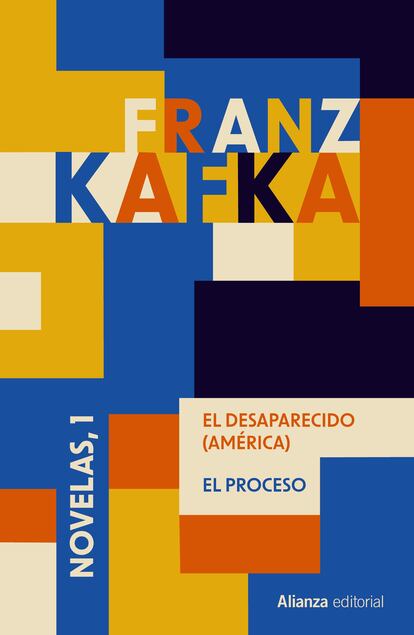
All three of Kafka’s novels were published posthumously. The first person responsible for editing them was Max Brod. But over the years that corpus has been rethought. The missingwritten in 1912, is the original title of the novel that Brod named America. Between 1914 and 1915 he wrote the unfinished version of The process. And in the castle He worked until 1922. All three can be purchased together in a special case for commemoration.
Chronological stories
Franz Kafka
Translation by Carmen Gauger and Adan Kovacsics. Illustration by El Rubencio. Editorial Alliance, 2024. 256 pages. 22.95 euros
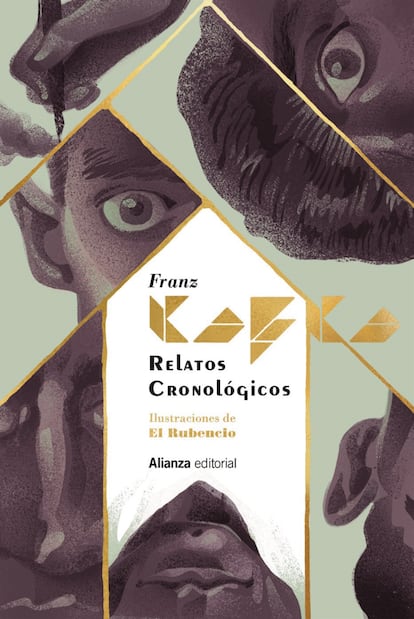
This volume collects 23 stories written by Kafka. Some are very well known and others are less so. The first is dated 1910 and the last shortly before he died in 1924. But this edition has a double uniqueness. On the one hand, they are illustrated by El Rubencio, who recreates the symbols and obsessions of the writer. On the other hand, they are arranged chronologically in a way that allows us to verify the evolution of the writer.
Letters to Kurt Wolff
Franz Kafka
Translation by Roberto Vivero. Ápeiron, 2024. 108 pages. 14 euros
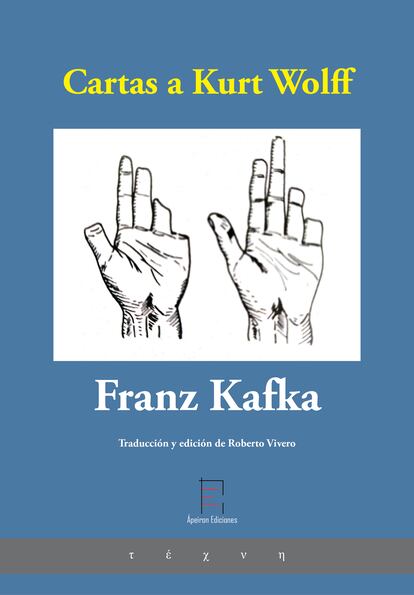
Sales the previous year had been very low and the publisher Kurt Wolff offered the author, rather than sending him four chavos, to pay him with copies of those books that were barely selling. The year was 1923. The volume compiles the writer’s correspondence with his editor (47 letters written between 1912 and 1923). As is the case on so many occasions, cards are the best tool to discover the person hidden behind the character. Kafka acted like just another writer, eager to publish and awaiting his reviews. And he knew he wasn’t read.
You are the task. Aphorisms
Franz Kafka
Translation by Luis Fernando Moreno Claros. Editing, prologue and comments by Reiner Stach. Cliff, 2024. 256 pages. 10 euros
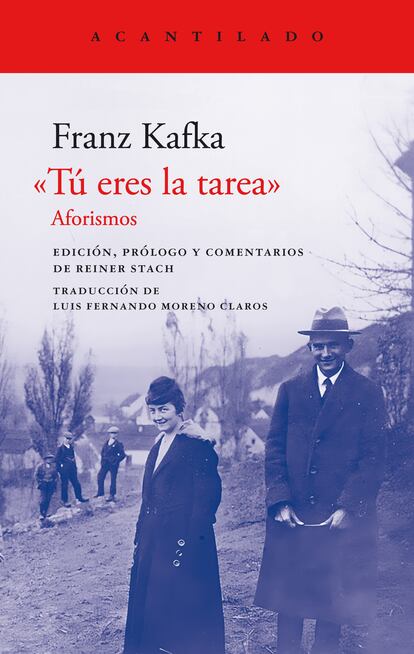
Between the months of October 1917 and February 1918, Kafka moved to a village in Bohemia when he was suffering from tuberculosis. He did not have to work nor did he want to advance with the works he had started, but he did not stop thinking or writing. He developed some complex aphorisms that were published in 1931. There is no better guide to understanding them than the introduction to this volume by Reiner Stach plus the comments he makes to each of them. The translation is by Luis Fernando Moreno Claros.
A hunger artist
Franz Kafka
Illustrations by Federico Delicado. Translation by Isabel Hernández. Nordic, 2024. 56 pages. 18 euros
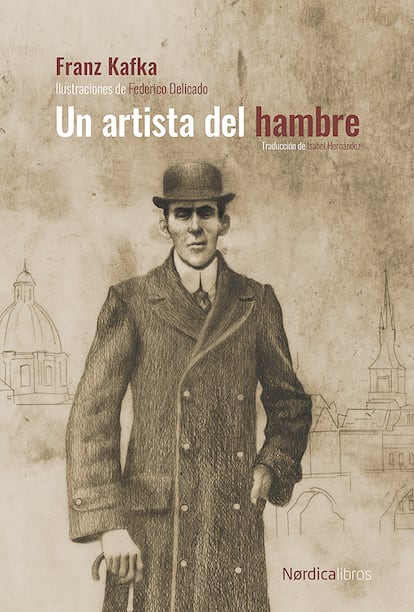
This story was published in a magazine in 1922. Its protagonist is a guy victimized by the society in which he lives: a professional faster lives caged in a circus and the public systematically ignores him. The translation is new and the edition is enriched with illustrations by Federico Delicado.
Children
Franz Kafka
Translation by Juan José del Solar. nocturnal, 2024. 152 pages. 16 euros
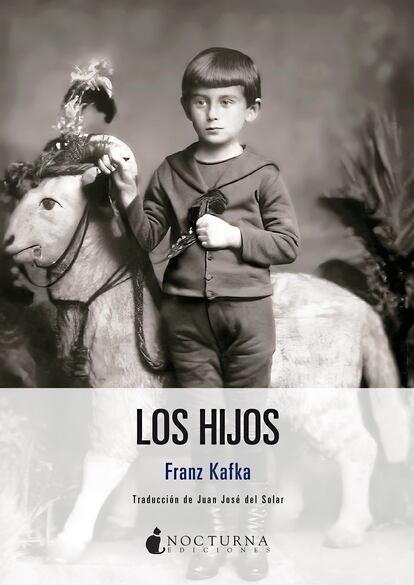
The project was Kafka’s and this is how he explained it to his editor. It made sense to compile three of his narratives in a single volume: Sentence, The stoker and The transformation. And he even had the title of the book in mind: Children. The relationship between parents and children would be the topic. Because the nature of that relationship was one of the moral drivers of his work: the paternal despotism, the suffering of the son. In German, the project saw the light in 1989. Now in Spanish
The process
Franz Kafka
Translation, notes and postface by Luis Fernando Moreno Claros. Arpa Editors, 2024. 332 pages. 19.90 euros
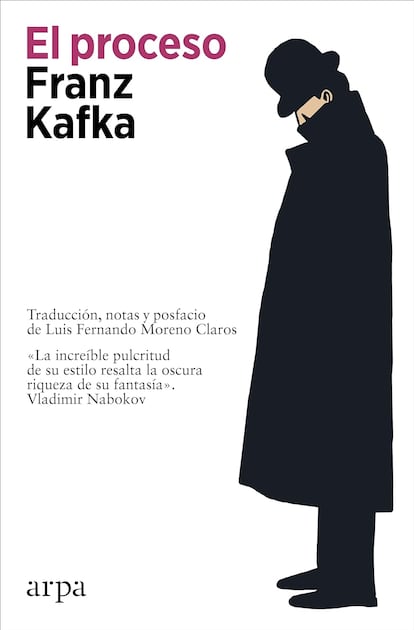
Published posthumously in 1925, just a year after Kafka’s death, The process immediately enthused. The novel is a paradigm of the Kafkaesque: the absurdity and confusion of man trapped in the networks of the contemporary world. This edition, prepared by the great specialist Luis Fernando Moreno Claros, provides significant new features: it is faithful to the original manuscripts, reorders the chapters and incorporates a fragment that until now had not been translated into Spanish.
animal stories
Franz Kafka
Translation by José Rafael Hernández Arias and Luis Fernando Moreno Claros. Afterword by Reiner Stach. Arpa Editors, 2024. 208 pages. 17.90 euros
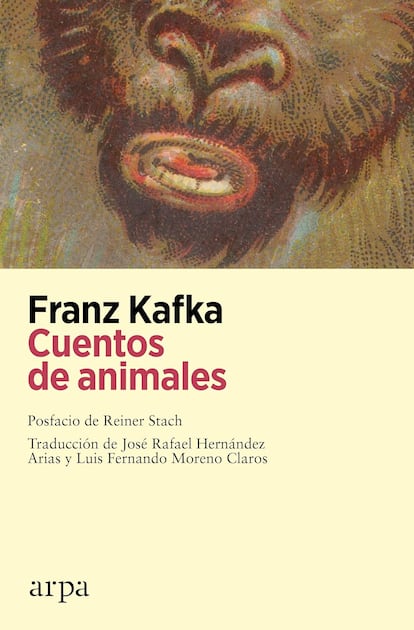
A mole, a monkey, a jackal, a horse, a vulture, a mouse, a dog. Animals are the protagonists of the stories collected in this volume. They act in a mysterious way, they demonstrate how far the writer’s imagination could go. “These animals are like mirrors: their sufferings and joys are ours,” writes Reiner Stach in the postface of the edition.
Kafka in full
Nicholas Mahler
Translation by Esther Cruz Santaella. Salamander Graphic, 2024. 128 pages. 19.90 euros
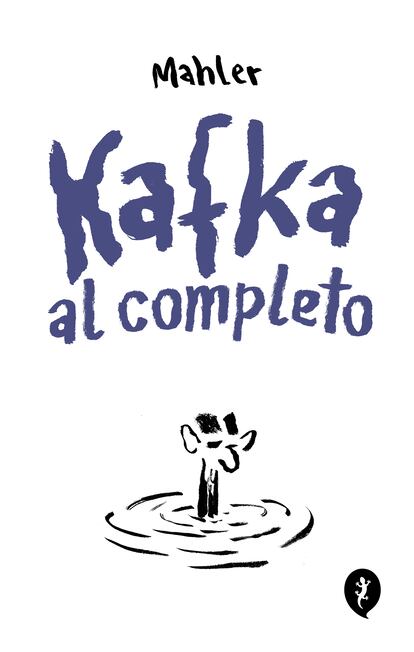
The Austrian Nicolas Mahler (1969) already paid tribute to Lewis Carroll in 2015, on the 150th anniversary of Alice in Wonderland, with his fun Alice in Sussex. Now, on the centenary of the death of the author of The process, The cartoonist dedicates a comic to a graphic biography of the bohemian writer. With his minimalism and mordacity, Mahler will bring more than a smile to the reader with this portrait of the writer’s life and work. An author who, at some point in his life, liked drawing more than writing, as the author of this reminds us. Kafka in full. On sale May 9.
You can follow Babelia in Facebook and xor sign up here to receive our weekly newsletter.
Subscribe to continue reading
Read without limits
_
#Franz #Kafkas #centenary #books